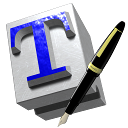
LaTeX is a software system for typesetting documents. LaTeX markup describes the content and layout of the document, as opposed to the formatted text found in WYSIWYG word processors like Microsoft Word, LibreOffice Writer and Apple Pages. The writer uses markup tagging conventions to define the general structure of a document, to stylise text throughout a document, and to add citations and cross-references. A TeX distribution such as TeX Live or MiKTeX is used to produce an output file suitable for printing or digital distribution.
TeX, stylized within the system as TeX, is a typesetting system which was designed and written by computer scientist and Stanford University professor Donald Knuth and first released in 1978. TeX is a popular means of typesetting complex mathematical formulae; it has been noted as one of the most sophisticated digital typographical systems.

LyX is an open source, graphical user interface document processor based on the LaTeX typesetting system. Unlike most word processors, which follow the WYSIWYG paradigm, LyX has a WYSIWYM approach, where what shows up on the screen roughly depicts the semantic structure of the page and is only an approximation of the document produced by TeX.

GNU TeXmacs is a scientific word processor and typesetting component of the GNU Project. It originated as a variant of GNU Emacs with TeX functionalities, though it shares no code with those programs, while using TeX fonts. It is written and maintained by Joris van der Hoeven and a group of developers. The program produces structured documents with a WYSIWYG user interface. New document styles can be created by the user. The editor provides high-quality typesetting algorithms and TeX and other fonts for publishing professional looking documents.

BibTeX is both a bibliographic flat-file database file format and a software program for processing these files to produce lists of references (citations). The BibTeX file format is a widely used standard with broad support by reference management software.
MiKTeX is a free and open-source distribution of the TeX/LaTeX typesetting system compatible with Linux, MacOS, and Windows. It also contains a set of related programs. MiKTeX provides the tools necessary to prepare documents using the TeX/LaTeX markup language, as well as a simple TeX editor, TeXworks. The name comes from the login credentials of the chief developer Christian Schenk, MiK for Micro-Kid.

XeTeX is a TeX typesetting engine using Unicode and supporting modern font technologies such as OpenType, Graphite and Apple Advanced Typography (AAT). It was originally written by Jonathan Kew and is distributed under the X11 free software license.
Yet Another Previewer is the name of two different document previewing applications, one for DVI and one for PostScript.
This article provides basic comparisons for notable text editors. More feature details for text editors are available from the Category of text editor features and from the individual products' articles. This article may not be up-to-date or necessarily all-inclusive.

TeXnicCenter is a free and open-source IDE for the LaTeX typesetting language. It uses the MiKTeX or TeX Live distributions. It allows the user to type documents in LaTeX and to compile them in PDF, DVI or PS. A menu gives access to precoded elements and environments. It also allows for the creation of projects to organize and access the sections and environments of documents, and to insert a bibliography and an index. TeXnicCenter was first released in 1999 by Sven Wiegand, it is included in ProTeXt and since version 2.02 it supports UTF-8 encoding.

WinEdt is a shareware Unicode (UTF-8) editor and shell for Microsoft Windows. It is primarily used for the creation of TeX documents, but can also be used to edit HTML or any other type of text file. It can be configured to run as a front-end for a variety of TeX systems, including MiKTeX, fpTeX and TeX Live. WinEdt's highlighting schemes can be customized for different modes and its spell checking functionality supports multi-lingual setups, with dictionaries (word-lists) for many languages available for downloading from WinEdt's Community Site. It supports DVI and PDF workflow.

JED is a text editor that makes extensive use of the S-Lang library. It is highly cross-platform compatible; JED runs on Windows and all flavors of Linux and Unix. Older versions are available for DOS. It is also very lightweight, which makes it an ideal editor for older systems, embedded systems, etc. JED's Emacs mode is one of the most faithful emulations available.

TeX Live is a cross-platform, free software distribution for the TeX typesetting system that includes major TeX-related programs, macro packages, and fonts. It is the replacement of its no-longer supported counterpart teTeX. It is now the default TeX distribution for several Linux distributions such as openSUSE, Fedora, Debian, Slackware, Ubuntu, Termux and Gentoo. Other Unix operating systems like OpenBSD, FreeBSD and NetBSD have also converted from teTeX to TeX Live.

GNU Emacs is a free software text editor. It was created by GNU Project founder Richard Stallman, based on the Emacs editor developed for Unix operating systems. GNU Emacs has been a central component of the GNU project and a flagship project of the free software movement. Its tag line is "the extensible self-documenting text editor."

TeXworks is free and open-source application software, available for Windows, Linux and macOS. It is a Qt-based graphical user interface to the TeX typesetting system and its LaTeX, ConTeXt, and XeTeX extensions. TeXworks is targeted at direct generation of PDF output. It has a built-in PDF viewer using the poppler library; the viewer has auto-refresh capability, and also features SyncTeX support.
The following is a comparison of TeX editors.

TeXML [tɛχːml] is – as a process – a TeX-based alternative to XSL-FO.

GNOME LaTeX is a TeX/LaTeX editor to edit TeX/LaTeX documents. It runs on Linux systems with the GTK library installed.

Gummi is a LaTeX editor. It is a GTK+ application which runs on Linux systems.












